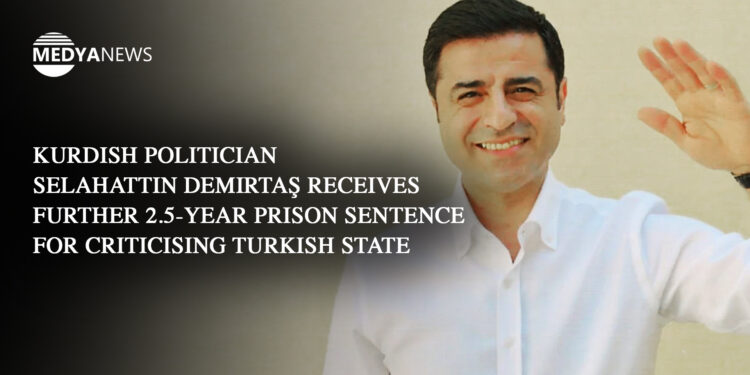Selahattin Demirtaş, a former co-chair of Turkey’s pro-Kurdish Peoples’ Democratic Party (HDP), was sentenced to an additional two and a half years in prison for criticising Turkish state institutions.

The 13th hearing in the case was held at Mersin Criminal Court No.14, with Demirtaş participating by videolink from Edirne F-Type High Security Prison. Demirtaş’s lawyers, along with Peoples’ Equality and Democracy (DEM) Party MP Ali Bozan, attended the hearing in person. Demirtaş’s family also followed the proceedings remotely, from Diyarbakır (Amed).
During his defence, Demirtaş criticised the prosecution’s submission as being a mere ‘copy-paste’ job devoid of any legal substance. He claimed that the case against him was politically motivated, asserting that it was part of a broader strategy to undermine Kurdish political figures and stifle dissent. He argued that the case reflected a systemic bias in Turkish jurisprudence, highlighting discrepancies with the way similar accusations were treated in cases involving other figures, such as mafia leaders or controversial public figures.
Demirtaş stressed his belief that the Turkish judiciary is biased against him due to his Kurdish identity. He drew comparisons with other political figures and alleged that the legal system favours individuals who support the ruling regime or have connections to criminal networks. He pointed out that while some individuals with alleged criminal connections received leniency, he himself faced harsh penalties for his political activities and statements.
He accused the state of practising systematic discrimination against Kurdish politicians and criticised the government’s handling of several high-profile cases, including those of human rights abuses and political violence. He claimed that the legal system was manipulated to serve political purposes rather than justice, and highlighted what he sees as a fundamental injustice in the way the legal system treats different groups within Turkey.
Following the defence presentations, the court sentenced Demirtaş to a total of 3 years in prison under Articles 301 (publicly insulting state institutions) and 216 (inciting hatred and hostility) of the Turkish Penal Code. However, the court subsequently applied a reduction by judicial discretion, reducing his sentence to 2 years and 6 months.
Mahsuni Karaman, a lawyer with the Diyarbakır Bar Association, commented on the case, stating that the tradition of political justice remains unchanged, with those who expose massacres being punished while the perpetrators go free:
“According to Mersin Criminal Court No.14, Selahattin Demirtaş has been sentenced to 2 years and 6 months in prison for publicly insulting state institutions and inciting hatred and hostility. This judgement is related to his statements about various massacres including the Zilan massacre of 1930, the Cizre incident, the Ankara Railway Station bombing on 10 October, the Suruç bombing on 20 July, and the Diyarbakır massacre on 5 June [all in] 2015, and also including remarks relating to the murders of the mother Taybet İnan, whose body was left on the street for seven days, Cemile Çağırga, whose body had to be preserved in a refrigerator, Hacı Lokman Birlik, whose body was dragged by an armoured vehicle and Kevser Eltürk, whose body was displayed naked in Varto. The political judiciary tradition remains unchanged: those who commit massacres are not punished, but those who criticise them are. This is the price of speaking out against massacres.”
The DEM Party expressed its strong disapproval of the verdict, stating, “Demirtaş’s two and a half year prison sentence is null and void in our eyes. We stand by Selahattin Demirtaş and will continue to fight for justice regardless of this decision.”
DEM Party Co-chair Tuncer Bakırhan also condemned the ruling on his X (formerly Twitter) feed, asserting, “Our comrade Selahattin Demirtaş was sentenced to two and a half years in prison for defending life against the regime’s policies of death. This unlawful decision is void, and no force can erase the truth with prison sentences.”
This recent sentence adds to Demirtaş’s already lengthy imprisonment due to the notorious Kobani case. On 16 May, an Ankara court reached a final decision in the eight-year Kobani Trial. Along with several party executives, former HDP co-chairs Selahattin Demirtaş and Figen Yüksekdağ received sentences of 42 years and 32 years and 9 months respectively. The case arose from the events of 6-8 October 2014, when mass demonstrations erupted in Kurdish-majority southeast Turkey over the government’s supportive stance towards the ISIS siege of the city of Kobani (Kobanê) in northern Syria. The protests led to clashes with police and fascist groups, resulting in numerous deaths, the majority of whom were HDP supporters. However, the Turkish government launched an overarching ‘conspiracy trial’ against HDP members, aiming to dismantle its political opposition.
Global media has been broadly critical of the sentences against the HDP co-leaders and their co-defendants in the trial. Human Rights Watch called the charges against the politicians ‘bogus’ and ‘part of a campaign of political persecution’.








Leave A Comment